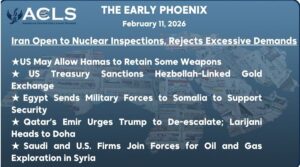THE EARLY PHOENIX
Aug 22, 2024
=================
Israel & Palestinian Territories
-
Biden Reaffirms Military Support to Israel as Netanyahu Reverses Ceasefire Promise
In a call with Israeli Prime Minister Netanyahu, President Biden reaffirmed U.S. military support to Israel against Iranian threats. Biden emphasized the urgency of finalizing a Gaza ceasefire and the release of hostages as a priority.
Although Netanyahu initially promised flexibility in negotiations, he later reversed his position, causing frustration among U.S. officials. Netanyahu insisted on maintaining Israeli troops along the Gaza-Egypt border, complicating ceasefire efforts.
New ceasefire talks involving U.S., Israeli, Egyptian, and Qatari representatives are set to continue in Cairo. Meanwhile, the U.S. deployed the USS Abraham Lincoln to the Middle East to reinforce its naval presence.
Regional tensions continue to rise, increasing the stakes of ongoing negotiations and military actions.
-
Gunshot Wounds Found on the Six Hostages Retrieved from Gaza
The Israeli army reported finding gunshot wounds on the bodies of six hostages recovered from Gaza.
These hostages were taken during the ongoing conflict between Israel and Hamas, now in its 321st day.
The retrieval of the bodies coincides with Israeli tanks advancing deeper into Gaza, where 22 Palestinians were reported killed in the last day.
-
Israeli Doctor Arrested for Pledging Allegiance to ISIS
Muhammad Azzam, a doctor at Soroka Medical Center, was arrested for pledging allegiance to ISIS following an investigation by Israel Police and the Shin Bet.
The 34-year-old Beersheba resident had engaged in ISIS-related activities since 2014, consuming extremist content and celebrating terrorist atrocities.
An indictment filed on August 8, 2024, revealed that Azzam stored media files of executions and bomb-making instructions on his phone.
He has been detained as a public threat after authorities discovered his mockery and celebration of the October 7 atrocities against Israelis.
-
Israeli Drone Strike Kills Three Palestinians in Tulkarm Refugee Camp
Three Palestinians were killed in a drone strike during an Israeli military operation in the Tulkarm refugee camp, West Bank, according to the Palestinian health ministry.
The Israeli military stated that the strike targeted armed militants amid clashes in the camp, where troops also uncovered improvised explosive devices.
This incident is part of a broader escalation of violence in the West Bank, with confrontations between Israeli forces and Palestinian militants intensifying since the Gaza conflict began.
-
Ultra-Orthodox Israelis Clash With Police Over Military Draft Orders
The Supreme Court ruling ended long-standing military draft exemptions for ultra-Orthodox Israelis, sparking rising tensions within the community.
Following the ruling, the military began sending conscription orders to ultra-Orthodox men aged 18 to 26, who were previously exempt due to religious studies. In response, hundreds of ultra-Orthodox Israelis protested in Jerusalem, clashing with police.
The protest escalated as demonstrators scuffled with officers and counter protesters. Five arrests were made during the clashes as police used water cannons and batons to disperse the crowd.
=================
Israel-Hezbollah Crisis
-
Intense Israeli Airstrikes on Lebanon as Hezbollah Strikes Back
Israeli forces launched large-scale airstrikes on southern Lebanon early Thursday, targeting over 10 Hezbollah sites, including weapon depots.
The airstrikes also targeted military facilities following a missile strike on the Golan Heights, increasing regional tensions. These strikes, concentrated in areas like Marjayoun, Naqoura, and Bent Jbeil, were met with heavy artillery bombardments and drone patrols.
In response, Hezbollah shelled the Israeli Branit military base near the Lebanese border and claimed a direct hit. An anti-tank missile fired from Lebanon exploded in the Israeli town of Metula, causing property damage but no injuries.
Lebanese caretaker Foreign Minister Abdullah Bou Habib warned the situation could spiral out of control if Gaza ceasefire talks fail.
There are growing calls within Lebanon to open an alternative airport due to perceived risks at Beirut’s Rafic Hariri International Airport.
-
China Urges Citizens to Leave Lebanon Immediately
China urged its citizens to leave Lebanon “as soon as possible” after an Israeli strike killed a senior Fatah member.
The Chinese embassy in Beirut highlighted the dangerous and complicated security situation, particularly near the Israeli border.
The embassy raised the travel risk level to red for southern Lebanon and Nabatieh, urging caution.
Citizens were advised to use available commercial flights to return to China or leave Lebanon promptly.
===============
Iran
-
Iran Constructs 30 Satellites as Space Program Accelerates
Iran is currently constructing 30 homegrown satellites, according to Hassan Salariyeh, head of the Iranian Space Agency.
Since August 2021, 12 satellites have either been launched or are ready for deployment, showcasing rapid progress.
This accelerated pace in satellite development is due to collaborations with the private sector, according to Salariyeh.
Iran’s space program has made significant strides, including launching its first military satellite in April 2020.
Additionally, Iran launched a second military satellite in March 2022, further advancing its space capabilities.
Iran is also building the largest space center in the Middle East in Chabahar.
The Imam Khomeini National Space Center continues to play a crucial role in Low Earth Orbit missions, supporting Iran’s growing space ambitions.
-
America’s Iran Policy Failed as Tehran’s Influence Grows Unchecked
The escalating conflict between Israel and Iran reveals the broader failure of U.S. foreign policy in containing Iran’s ambitions over the past decade.
Despite efforts to impose economic sanctions, diplomatic isolation, and military containment, Iran has expanded its regional influence through proxies in Lebanon, Yemen, Iraq, and Syria.
The U.S. approach of avoiding direct confrontation has allowed Iran to grow into a significant regional power, capable of launching direct attacks on Israel and U.S. allies with minimal consequences.
Recent events, including Iran’s military advances and the killing of key Hezbollah and Hamas leaders, underscore the collapse of American deterrence in the Middle East.
As the U.S. hesitates to engage militarily, Iran’s influence continues to expand, challenging U.S. power and stability in the region.
-
Hardliners Challenge Claims of Khamenei’s Control Over Cabinet Selections
Hossein Shariatmadari, editor-in-chief of Iran’s conservative newspaper Keyhan, openly challenged President Masoud Pezeshkian’s recent statements regarding ministerial appointments.
Shariatmadari urged the president to amend his claim that the selection process was coordinated with Supreme Leader Ali Khamenei.
He argued that such statements undermine the role of parliament and presidential authority in Iran, providing grounds for critics to question the democratic integrity of the Islamic Republic.
This internal dispute exposes significant tensions over governance transparency and power dynamics within the Iranian regime.
-
Hardliners Push Hijab Bill, Threatening Pezeshkian’s Promises on Reform
Hardliner lawmakers advanced a hijab bill, challenging President Pezeshkian’s pledge to end hijab patrols and violence against women.
The bill, amended and sent to the Guardian Council for approval, could force Pezeshkian to enact it, despite his promises to voters.
If approved, Pezeshkian is legally required to sign the bill within five days, risking backlash.
Previous presidents, like Rouhani, have refused to sign similar legislation, passing responsibility to the Parliament Speaker.
-
89 Iranians Charged Five Years After 2019 Protests
Five years after the 2019 protests triggered by a surge in petrol prices, 89 residents of Kohgiluyeh and Boyer-Ahmad Province face charges.
The Public and Revolutionary Prosecutor’s Office in Likak City accuses them of disturbing public order, destruction, and arson.
The charges stem from their involvement in nationwide demonstrations, with evidence including video footage and intelligence documents.
The 2019 unrest, marked by significant suppression by authorities, saw widespread public dissent across Iran.
-
Araghchi’s Appointment: Diplomatic Face with Deep IRGC Ties
Abbas Araghchi’s appointment as Iran’s Foreign Minister has sparked debate due to his deep ties with the IRGC.
Despite being portrayed as a pragmatic diplomat, his loyalty to Iran’s Supreme Leader and commitment to supporting regional proxies are clear.
Araghchi’s connections to the Quds Force raise concerns about his ability to manage Iran’s foreign policy under sanctions.
His role in Masoud Pezeshkian’s cabinet reflects a blend of diplomacy and hardline military influence.
-
Iran’s Exports To Afghanistan Surge, Eyes $10 Billion Target
Iran’s exports to Afghanistan have risen by 31%, according to Mahmoud Siyat, who leads the Iran-Afghanistan Joint Chamber of Commerce.
Following an initial dip after the Taliban took power, bilateral trade has flourished, totaling $517 million in the first quarter of this year.
Siyat predicts potential growth to $10 billion if trends persist.
He urged joint investments, noting new Taliban tariffs on Iranian goods, and spotlighted Afghanistan’s promising mining and agriculture sectors.
-
Iranian Military Denies Report on Raisi Helicopter Crash Causes
The Iranian General Staff has dismissed claims about the helicopter crash that killed former President Ibrahim Raisi.
Reports by Fars News attributed the crash to overloading and poor weather, but the General Staff labels these as “false.”
They emphasize relying on official sources for investigation results.
An earlier military report had already excluded the possibility of an attack or foul play in the incident.
==============
Iraq
-
Iraq and Kazakhstan Submit Plans to Offset Oil Production Surplus
The OPEC Secretariat announced on Thursday that Iraq and Kazakhstan have submitted updates to their plans to offset the oil production surplus accumulated during the first seven months of 2024.
These plans aim to address the surplus by September 2025. OPEC noted that Iraq’s accumulated production surplus amounted to 1.4 million barrels per day between January and July, while Kazakhstan recorded a surplus of 699,000 barrels per day.
-
Saudi Foreign Minister Arrives in Baghdad to Strengthen Cooperation and Discuss Regional Developments
Saudi Foreign Minister Faisal bin Farhan has arrived in Baghdad on an official visit, where he will hold talks with senior Iraqi officials.
The visit aims to enhance bilateral relations between Saudi Arabia and Iraq, as well as to discuss the latest developments in the region.
This visit is part of efforts to strengthen mutual cooperation and address issues of common interest between the two countries, in light of the current regional developments.
=================
Yemen
-
Drone Boat Incident Damages Ship Near Yemen, Raises Security Concerns
The UK Maritime Trade Operations (UKMTO) reported minor damage to a ship from an explosion, following an encounter with a drone boat 57 nautical miles south of Yemen’s Aden port.
Concurrently, Ambrey, a British maritime security firm, observed a fire in the Red Sea, about 58 nautical miles southwest of As-Salif port. This fire possibly resulted from a drone boat’s destruction.
Ambrey highlighted the presence of hostile crewed and uncrewed vessels in the region, underscoring the area’s heightened maritime security risks.
=================
Syria
-
Jordanian Army Blocks Drug Smuggling Attempt From Syria
The Jordanian army announced successful interception of narcotics smuggled from Syrian territory on Thursday.
Coordinated efforts by the Eastern Military Region, military security, and the Anti-Narcotics Department halted the operation on Wednesday evening.
After a thorough search, authorities seized the narcotics and handed them to relevant officials.
The Jordanian Armed Forces reaffirmed their dedication to using all resources to prevent infiltration and smuggling, ensuring the Hashemite Kingdom of Jordan’s security and stability.
-
Turkish Forces Bolster Presence At Aleppo’s Abu Al-Zandin Crossing Amid Protests
In Aleppo province, Turkish forces have dispatched significant military reinforcements, including armored vehicles, troop carriers, and soldiers, to the Abu al-Zandin crossing near al-Bab in eastern Aleppo.
This deployment coincides with ongoing local protests at the crossing.
The Syrian Observatory for Human Rights noted that the crossing has been closed for two consecutive days due to public demonstrations against its reopening and violent clashes between protesters and Turkish-backed factions.
In response, military police overseeing the crossing have increased their presence, preparing for potential escalation in unrest.
-
German Envoy Exposes Syrian Regime’s Failure To Eliminate Chemical Weapons
On the 11th anniversary of the Eastern Ghouta chemical attack, resulting in over 1,400 deaths, German envoy Stefan Schneck announced a significant revelation: the Syrian regime has not fully declared or destroyed its chemical weapons arsenal.
Despite international pressures and commitments, including membership in the Organization for the Prohibition of Chemical Weapons (OPCW), the Assad regime remains non-compliant with its international obligations.
-
Russian Spokesperson Stresses Importance Of Turkey-Syria Dialogue
Russian Foreign Ministry spokesperson Maria Zakharova emphasized the necessity of normalizing relations between Ankara and Damascus.
She pointed out the error in failing to engage with Syrian officials, speaking during an interview with Rudaw on August 22, 2024.
Zakharova highlighted the foundational dialogue from last year involving Turkey, Iran, and Syria, which she believes should be strengthened to resolve the Syrian crisis and boost regional stability.
She reaffirmed Russia’s commitment to help rebuild ties between Turkey and Syria, as demonstrated in the Astana talks.
Additionally, Zakharova criticized Western attempts to isolate Syria and confirmed Russia’s support against international terrorism and pressures on Syria.
=================
The Gulf
-
Tether Plans to Launch Emirati Dirham-Pegged Stablecoin
Tether, a top cryptocurrency company, plans to launch a stablecoin tied to the Emirati Dirham.
This aims to meet the rising demand for Gulf currencies, offering an alternative to the U.S. dollar.
The UAE seeks to become a global cryptocurrency hub, promoting crypto payments in sectors like real estate and education. This has led to higher adoption and transaction volumes.
The launch of the Dirham-backed stablecoin, in collaboration with Phoenix, is pending approval from the UAE Central Bank, which could take months. Tether’s market cap is primarily tied to the U.S. dollar, standing at $112.4 billion.
-
Saudi Arabia’s Trade Surplus Falls to $26 Billion in Q2 2024
Saudi Arabia’s trade surplus decreased by 6% to 98.4 billion riyals ($26.2 billion) in Q2 2024, down from 104.7 billion riyals in Q2 2023.
This is according to data released on Thursday by the Saudi General Authority for Statistics.
Non-oil exports, including re-exports, rose by 10.5% year-on-year, reaching 73.73 billion riyals in Q2 2024, up from 66.74 billion riyals in the same period in 2023. Non-oil exports, excluding re-exports, also increased by 1.4%.
However, total merchandise exports dropped slightly by 0.2% to about 295 billion riyals, driven by a 3.3% fall in oil exports to 220.8 billion riyals.
-
Taqa and JERA Secure Financing for Satorp Expansion in Saudi Arabia
Abu Dhabi National Energy Company (Taqa), along with Japan’s largest electricity generator JERA, has secured financing for the expansion of the Satorp power plant in Saudi Arabia.
The new industrial cogeneration plant will provide electricity and steam to the petrochemical complex in Jubail, Eastern Province.
It will generate about 475 megawatts of electricity and 452 tons per hour of steam using advanced combined cycle gas turbines.
The project is developed by Najm for Cogeneration Limited, a company jointly owned by Taqa (51%) and JERA (49%), under a 25-year build, own, operate contract, which can be extended by five years.
The plant also has potential for future carbon capture and hydrogen fuel integration.
-
UAE Extradites Financial Crimes Convict Danilo Coppola to Italy
The UAE has extradited Italian citizen Danilo Coppola to Italy, where he faces charges for financial crimes.
This decision was made following Italy’s formal request, in line with the bilateral extradition treaty between the UAE and Italy.
UAE Minister of Justice Abdullah bin Sultan bin Awad Al Nuaimi and Italian Minister Carlo Nordio praised Coppola’s successful extradition.
They stated this extradition demonstrates the ongoing commitment of both nations to uphold the rule of law.
The ministers highlighted that this action enhances the deep relations between the UAE and Italy, showing their resolve.
This agreement also emphasizes both countries’ dedication to legal and judicial cooperation, especially in combating serious and organized crime.
==================
Türkiye
-
Türkiye Accused of Forcing Syrian Refugees to Return Despite Official Denials
Testimonies and reports contradict Turkish Foreign Minister Hakan Fidan’s claim that Türkiye did not force any Syrian refugees to leave.
The organization Syrians for Truth and Justice documented over 57,000 deportations in 2024, with refugees reportedly coerced into signing “voluntary return” papers under threat.
These actions are in violation of Türkiye’s obligations under the principle of non-refoulement, which prohibits forced returns to conditions deemed unsafe.
-
Turkish Ministry of Defense Announces Neutralization of 38 Terrorists Within a Week
The Turkish Ministry of Defense announced the neutralization of 38 terrorists in operations conducted over the past week.
Zeki Aktürk, the Ministry’s Media and Public Relations Advisor, detailed that these operations targeted terrorist organizations in northern Iraq and Syria, including PKK/YPG-PYD, ISIS, and FETÖ.
Since January 2024, forces have neutralized 1,763 terrorists, with 868 in northern Iraq and 895 in northern Syria.
Additionally, forces apprehended 337 individuals attempting illegal border crossings, including 8 terrorist members, and prevented 1,381 others from infiltrating.
==================
Previous Editions:
The Middle East: A Region At War, Epidemics, and Disturbing Details
🔗 Follow the latest news from the American Center for Levant Studies via Google News



